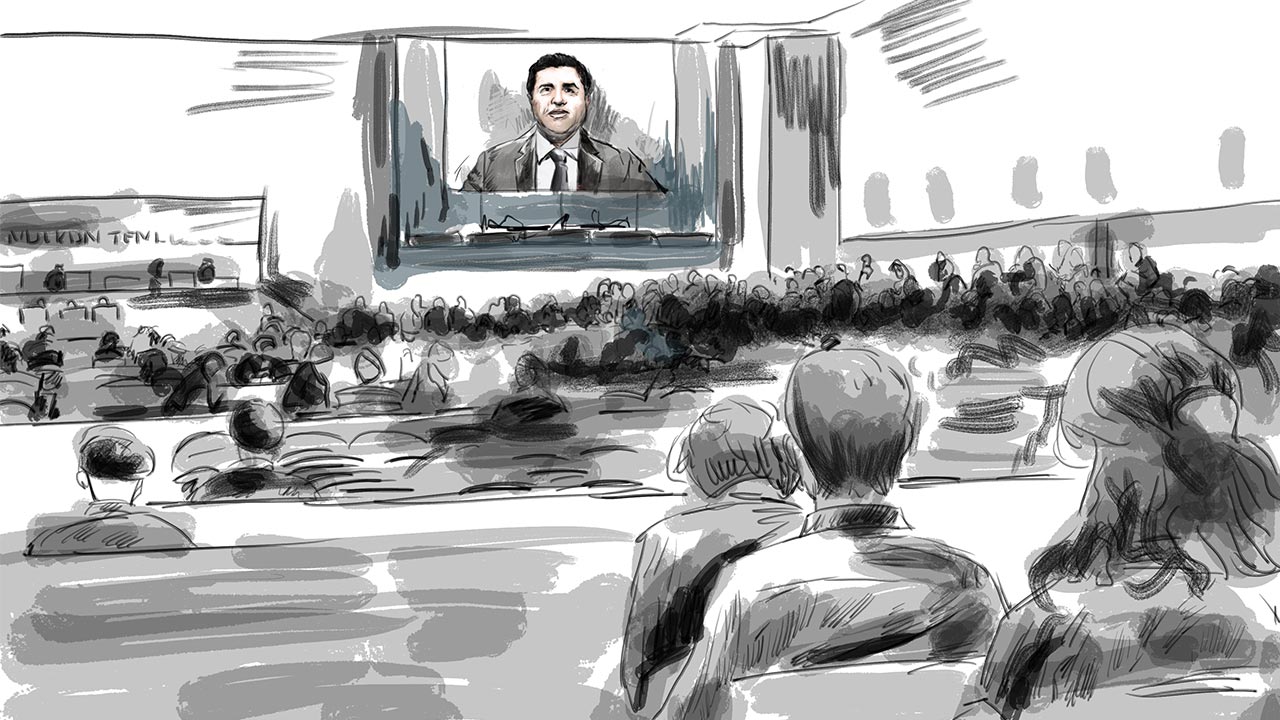The trial of the Kobani Case began in Ankara amidst lawyers’ protests and a police blockade in front of and inside the courtroom which is located in Sincan Prison, a high security prison campus in Ankara.
The lawyers had protested against the court board’s “ban on defence” by not allowing all lawyers of the defendants to be present in the courtroom. After the lawyers’ protest, which involved them all leaving the courtroom, the board cancelled the ban and all lawyers were allowed to take up their defence seats. Reportedly, riot police had earlier filled the areas reserved for lawyers.
Peoples’ Democratic Party (HDP) politicians, observing that all of their lawyers had initially not been allowed into the court, refused to share any ID information during the identification of the defendants by the court. Some shared their protest statements.
Having been jailed in Silivri Prison, HDP former co-chair Selahattin Demirtaş – who was amongst the 108 defendants who were connected to the trial by a video conferencing system – supported and applauded the lawyers’ protest, Gazete Duvar reported.
Demirtaş in his video conference speech stated: “We are here not to remain silent but to talk”. He shared the following statement: “We are not here to be tried, we are here to judge. The number of the lawyers were determined beforehand. If there were three lawyers for each defendant, that would make it more than 100 lawyers. It was known (in advance, therefore), that the courtroom would be crowded. You could have solved this problem”.
He added: “The Kobani Case trial is expected to take place in an Ankara court for over a month. If you want this trial to continue, you can provide a recess to solve this problem. Of course, we will share our ID information with the court. You can ask all the questions you want to ask and we will make our defence. You have been putting us on trial for years. Do not confuse us with the others. Do not raise your voice.
“You are not facing children here: you face the co-chairs of the parliamentary group of the third biggest party of Turkey. We might be sitting in defendants’ chairs, but we represent the will of the people. We are civil people. You have tried the coup makers: I have no idea how you did that, but it is certain that you cannot treat us the way that you treated them”.
In terms of defendants’ rights, he stated: “Lawyers have to be present in this courtroom. Let the lawyers come in. I am not there, the lawyers are not there. I have no chance to detect an illegal claim against me that might be put forward in that courtroom. Even though you conduct this trial under such oppressive circumstances, you still need to let lawyers in”.
Demirtaş, behind bars for four years, also reacted to the Chief Judge who asked him for his ID information. “I will not answer that question. Let alone an answer, I would not share the burden of any of my sins with you”, he said. The court board, in reaction to this and the lawyers’ protest, eventually decided to admit all lawyers into the courtroom.
As no cameras were allowed into the courtroom, Ercan Altuntaş, a courtroom painter shared the atmosphere of the historic trial with his drawings. These drawings have been shared by the HDP’s Twitter account.
Bugün Figen #Yüksekdağ yine zulmün gözüne bakarak insanlık onurunu, hakikati ve adaleti savunacak. Ambargo altına aldıkları mahkeme salonundan, rehin tutulan yoldaşlarımızın dimdik duruşunu paylaşıyoruz. #HDPyargılıyor pic.twitter.com/DmKJxy7VDj
— DEM Parti (@DEMGenelMerkezi) April 26, 2021
Demirtaş has been imprisoned since November 2016 on terrorism-related charges despite two binding rulings in favor of his release by the European Court of Human Rights (ECHR). Whilst the European Parliament on Jan. 21 adopted a resolution calling on Turkey to immediately release Demirtaş, the Turkish authorities still refuse to release him.










